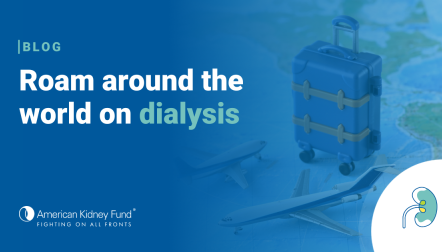
Blog post
Home (Dialysis) for the Holidays

For many of us, the holidays involve traveling to visit family, friends and loved ones, or just taking a vacation. While holiday travel can bring us joy and great memories, it can also involve stress and anxiety. For people with kidney failure who use home hemodialysis, this stress and anxiety is only magnified. However, with preparation, people on home hemodialysis can travel safely and enjoy the holidays while getting the lifesaving treatment they need.
"Travel is definitely doable, but it requires an incredible amount of advanced planning," said Nieltje Gedney, executive director of Home Dialyzors United and a user of home hemodialysis. "When I travel, I think every step through, starting from the moment I leave my house. I can't encourage people enough to research their departure and destination points."
Before taking a big trip, Nieltje strongly urges home hemodialysis users to do a short practice trip first. "Don't plan to go and take a two-week excursion on a plane as your first trip because it can be overwhelming," Nieltje said. "There's so many different variables and factors you want to be on the lookout for, so always start with a practice run."
While traveling, home hemodialysis users have two options for receiving their treatment: take their dialysis machine with them or arrange to go to a clinic at their destination. "It's a matter of personal preference," said Nieltje. "Some people find that it's too difficult to lug their machine around, as it weighs 100 pounds when combined with the air travel carrying case." To date, there is only one airline-approved portable carrying case.
Nieltje said that flying is the best way to travel for people who bring their dialysis machines with them if driving is not feasible. "The Americans with Disabilities Act (ADA) is divided under many different umbrellas," she said. "The Federal Aviation Administration covers the airports, while the airlines are covered by the Department of Transportation (DOT). Unfortunately, with buses and trains, there is no requirement for these modes of transportation to accept dialysis devices from passengers. It's at the discretion of the bus driver whether s/he will allow you to load your devices onboard, and with trains, there are no luggage racks and no one to help you load, which is a major issue."
When flying with dialysis equipment, people should call the disabilities desk at their respective airline. "Get in your record that you are traveling with a life-assisting medical device," Nieltje said. People should then figure out how to get themselves, their equipment and their luggage from their car to the airport. "If you put your car in long-term parking, you have to get your luggage from your car to the shuttle bus, and then off the bus once it arrives at the airport," Nieltje continued. "I recommend using 'Pay to Park,' 'Park and Ride,' or 'Park and Fly' services, where you keep your car at a hotel and the hotel shuttle brings you to the airport. They will help you with your luggage and bring you right to your airline gate." Nieltje also stressed that travelers should visit the websites for the airports they will be using and familiarize themselves with their layouts and ADA features.
Although it is federal policy under the Air Carrier Access Act of 1990 for airlines to allow people to bring life-assisting medical devices onboard for free, not all airline staff are aware of this, which can lead to challenges for people traveling with dialysis machines. "I usually encourage people to make a copy of the regulation and hand it to airline staff when they're checking in," said Nieltje. Even if the airline has specific policies, the federal policy will always trump those. If an airline continues to hassle people, those passengers have a right to file a complaint with the DOT.
People who choose to receive their dialysis at a clinic while they are away also need to plan in advance. Nieltje recommends that people arrange their treatment at least six weeks before their trip and said it's critical to confirm an appointment several times. This is especially important during the holiday season, as clinics are typically not open on major holidays and can be in high demand this time of year.
While traveling with dialysis equipment requires immense amounts of preparation, Nieltje said the rewards make it worthwhile. "The beauty of home dialysis is that you can dialyze at your own convenience," said Nieltje. "If you're doing a family holiday event one day and that's your day for treatment, you can move your treatment to the next day and it's probably not a big deal. Home dialysis involves a lot of work, but the reward is that you will have more freedom and independence as a result."
For more detailed information about traveling with home dialysis equipment, including getting through airport security, boarding your mode of transportation, and bringing your equipment and luggage to hotels and lodging, visit Home Dialyzors United's webpage on traveling. AKF's webpage on traveling with kidney disease is also a useful resource.
Visit kidneyfund.org/health-equity-home-dialysis for more information on home dialysis.





